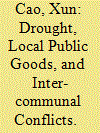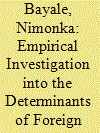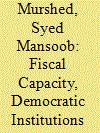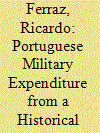|
|
|
Sort Order |
|
|
|
Items / Page
|
|
|
|
|
|
|
| Srl | Item |
| 1 |
ID:
184058


|
|
|
|
|
| Summary/Abstract |
Water charities and the UN development goals consider access to clean water and sanitation as transformative: improving personal dignity, quality of life and economic opportunities for individuals and the economic resilience of communities to climate stress. Can the provision of services also mitigate the conflict potential arising from climate change? If so, how broad must access be to become effective? We test how household access to improved water, sanitation, and electricity affects the probability of local conflict in nine drought-prone African countries. We use annual PRIO-GRID cells as the unit of analysis and model the probability of a grid-cell experiencing fatal armed conflict during local or proximate drought conditions. DHS data are used to calculate the percentage of households with access to specific services. We show that even relatively modest investments in reliable sanitation and water infrastructures enhance communities’ ability to avoid getting drawn into violent conflict in response to rainfall shocks.
|
|
|
|
|
|
|
|
|
|
|
|
|
|
|
|
| 2 |
ID:
184060


|
|
|
|
|
| Summary/Abstract |
This paper introduces model uncertainty into the empirical study on the determinants of foreign aid at the regional level. This is done by adopting a panel Bayesian model averaging approach applied on the data of 10 Sahel countries spanning from 1985 to 2017. Our results suggest that, among the regressors considered, those reflecting trade stakes including arm imports, institutional conditions and socioeconomic prospects tend to receive high posterior inclusion probabilities. These findings are robust to changes in the model specification and sample composition and are not meaningfully affected by the linear panel data model applied. The results highlight three concerns that justify aid flows towards Sahel countries: (i) interest of donors (self-interest), (ii) recipient economic needs and (iii) security purposes. The paper recommends Sahel countries to strengthen international cooperation for security and peace in compliance with the 13th goal of the Agenda 2063 of the African Union.
|
|
|
|
|
|
|
|
|
|
|
|
|
|
|
|
| 3 |
ID:
184059


|
|
|
|
|
| Summary/Abstract |
The purpose of this paper is to gauge the various determinants of social sector spending captured by social protection and education spending in a cross section of developing countries, a subject on which there is scant empirical evidence. We hypothesize that fiscal capacity is necessary but not sufficient for resource allocation in this area, because the political will to do so must also be present. Using a panel data instrumental variable approach, we find that greater fiscal capacity robustly raises social spending in developing countries in the period 1990 to 2010. It is also strongly evident that rising democratisation enhances social sector spending; the presence of greater democracy and higher fiscal capacity could reinforce this effect. Our work also innovatively incorporates inequality into the analysis, finding that social expenditure is greater in more egalitarian societies. Military expenditure also appears to crowd out social protection expenditure, but not robustly.
|
|
|
|
|
|
|
|
|
|
|
|
|
|
|
|
| 4 |
ID:
184063


|
|
|
|
|
| Summary/Abstract |
This paper examines the performance of the Greek defence industry in terms of their (co)authoring of scientific publications. In the context of knowledge-intensive technological and industrial policy, science outputs are important indicators of the respective intellectual capital of those firms. This is done through bibliometric analysis. Findings indicate that there is an increase in the number of publications over time. This is attributed to a small number of over performing firms – among which a super performer is identified. In terms of industrial classification, the NACE codes of these over performing firms overlap the respective bibliometric Subject Area Classifications. This is a clear indication of a match between scientific and industrial priorities. On the author level, findings indicate that a small number of authors (one per the top 10 firms) are responsible for a large (and in many cases, disproportionate) percentile of total publications per firm. Fourth, using keyword network analysis, most frequent keywords are detected pointing to specific topological clusters of research hotspots.
|
|
|
|
|
|
|
|
|
|
|
|
|
|
|
|
| 5 |
ID:
184061


|
|
|
|
|
| Summary/Abstract |
This paper establishes a new method of estimating public dissent that is both cost-effective and adaptable. Twitter allows users to post short messages that can be viewed and shared by other users, creating a network of freely and easily observable information. Drawing data directly from Twitter, we collect tweets containing specified words and phrases from citizens voicing dissatisfaction with their government. The collected tweets are processed using a regular expression based algorithm to estimate individual dissent; which is aggregated to an overall measure of public dissent. A comparative case study of Canada and Kenya during the summer of 2016 provides proof of concept. Controlling for user base differences, we find there is more public dissent in Kenya than Canada. This obvious, but necessary, result suggests that our measure of public dissent is a better representation of each country’s internal dynamics than other more sporadic measures. As a robustness check, we test our estimates against real-world civil unrest events. Results show our estimates of public dissent are significantly predictive of civil unrest events days before they occur in both countries.
|
|
|
|
|
|
|
|
|
|
|
|
|
|
|
|
| 6 |
ID:
184062


|
|
|
|
|
| Summary/Abstract |
Over a period of more than a century and a half (1852–2019), military expenditure in Portugal reached its highest values in the contexts of the Great War (1914–1918) and the Colonial War (1961–1974). In almost every year between these two conflicts, military expenditure was the most important sector within the structure of the Portuguese State. However, with the end of the Colonial War and Portugal’s entry into Democracy, there was a clear shift in this pattern. Since 1975, military expenditure has ceased to be the most important sector of the Portuguese State, and currently plays only a very reduced role, while social spending has today supplanted it as the most significant sector. Through the estimation of a dynamic model, it proved possible to identify some of the positive and negative effects of military spending on the Portuguese economy during the period 1874–2018. These results are a possibility that is supported by the theoretical framework.
|
|
|
|
|
|
|
|
|
|
|
|
|
|
|
|
|
|
|
|
|